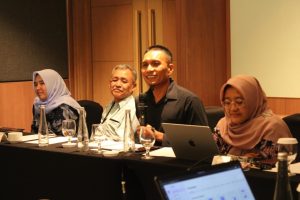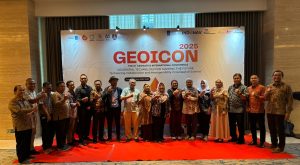On Wednesday, July 23, 2025, the APTTEGGI 2025 Roundtable was successfully held in conjunction with the GEOICON 2025 International Seminar, hosted by the Department of Geomatics Engineering, Institut Teknologi Sepuluh Nopember (ITS), Surabaya. The event served as a significant moment for program leaders of Geodesy and Geomatics Engineering from various universities across Indonesia to come together and discuss the future direction of academic development.
The roundtable was attended by representatives from numerous universities, including ITB, UGM, ITS, UNDIP, ITERA, UPN Yogyakarta, ITN Malang, Universitas Winaya Mukti, Universitas Pakuan, UNITOMO, and Universitas Indo Global Mandiri Palembang. Also present was Mr. Yusuf H. P., S.T., representing both the industry and the Indonesian Surveyors Association (ISI).
The session was moderated by Dr. L. M. Sabri, S.T., M.T., Head of the Undergraduate Program in Geodesy Engineering at Universitas Diponegoro. In his opening remarks, he expressed his hope that all study programs under APTTEGGI could make a stronger and more positive impact on the nation and society. According to him, the current challenge in higher education lies not only in improving academic quality but also in ensuring that graduates can directly respond to the needs of the professional world.
Education for Independent Learners and Standardization as a Benchmark
The first session was delivered by Prof. Ir. Leni Sophia Heliani, S.T., M.Sc., D.Sc., IPU from Universitas Gadjah Mada, who also serves as an assessor for LAM Teknik and IABEE. She emphasized that the goal of higher education is to shape students into independent learners, not merely individuals who complete coursework.
“In the era of Industry 4.0, jobs are increasingly hybrid in nature. Graduates are expected to possess a combination of skills from various fields, with soft skills taking a dominant role,” explained Prof. Leni.
The professor of geoid also highlighted the importance of adjusting curricula—not just focusing on technical aspects but also incorporating environmental, social, and economic considerations.
Dr. Ir. Kosasih Prijatna, M.Sc. from Institut Teknologi Bandung emphasized the need for standardization across several aspects of Geodesy and Geomatics Engineering education. Key areas that require joint discussion include: Standard graduate profiles, Detailed curriculum standards, Evaluation and assessment standards, Prioritizing standardization across educational levels. The senior lecturer, often referred to as Pak Piping, also suggested that these discussions be conducted in stages and involve stakeholders from industry and relevant institutions.
Graduate Characteristics and the Role of Academic Associations
As host of the event, Dr. Khomsin, S.T., M.T., Head of the Department of Geomatics Engineering at ITS, shared his perspective. He pointed out the need for clarity in differentiating between undergraduate and diploma graduates.
“If bachelor’s graduates are expected to be job-ready, then how are they different from diploma holders? Going forward, the curriculum must be developed with consideration for certification and competency testing,” he noted.
Dr. Khomsin also proposed that student certification be integrated gradually throughout their academic journey.
Dr. Danar Guruh Pratomo, ST, MT, Ph.D., a hydrography expert from ITS and Treasurer of APTTEGGI, added that the academic association must actively function as a facilitator in improving the quality of education.
“APTTEGGI must support its members and ensure that every study program has the opportunity to be involved in the process of setting standards,” he stated.
Strategic Steps Moving Forward
Dr. Sabri reaffirmed the critical role of APTTEGGI in bridging the gap between higher education and industry needs. He presented several key focus areas that need collective attention: Developing standardized graduate profiles, Designing a relevant and detailed curriculum, Establishing a clear system for learning outcomes assessment, Structuring standardization across educational levels, and Engaging in more intensive discussions with industry users and professional associations.
In closing, Dr. Sabri stated that the outcomes of this roundtable would be refined and finalized during a special session at the 2025 Annual Scientific Forum of the Indonesian Surveyors Association (FIT ISI), to be held in Malang.
He also extended his heartfelt appreciation to the Department of Geomatics Engineering at Institut Teknologi Sepuluh Nopember, Surabaya, for their outstanding support in organizing this event.
See you in Malang!




